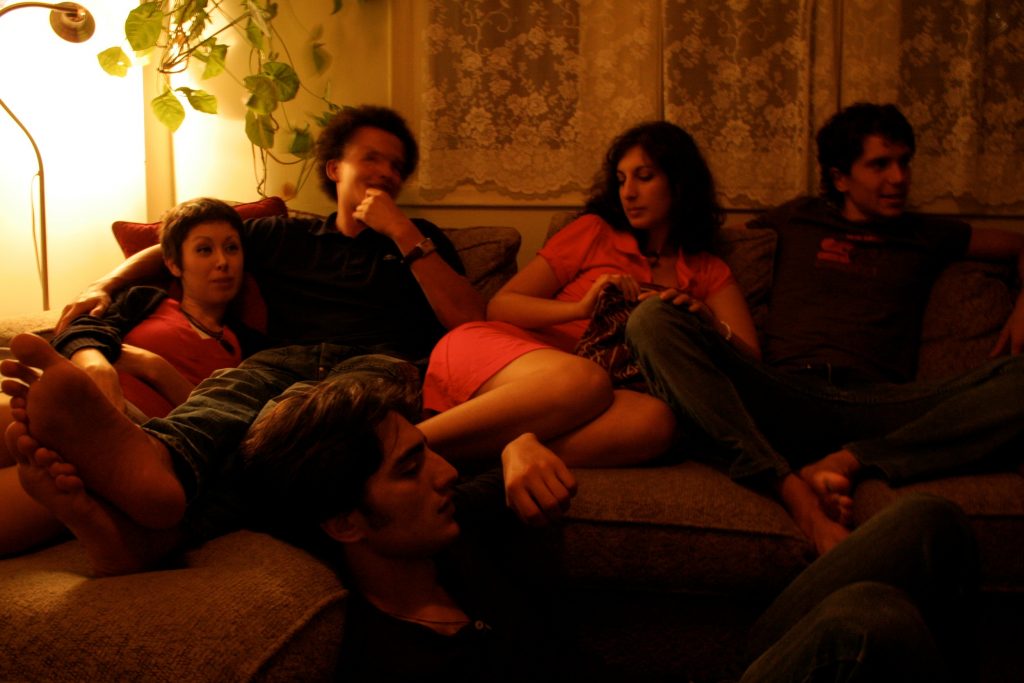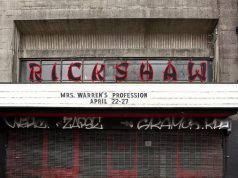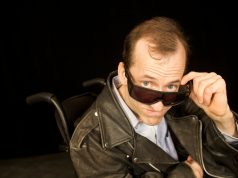Recently, I was asked to be a speaker at a queer theatre conference in Vancouver on a panel called: The Queer Playwright. Not for the first time, the facts of who I sleep crashed against the theatre I write. Maybe this time I actually had to deal with it? Maybe not.
The truth is I’m a feminist bi-poly slut and my primary partner is a bi-poly sis dude. Or maybe not.
The truth is I’m the mother of a three-year-old in a mostly monogamous heterosexual marriage. Or maybe not.
The truth is I’m a survivor of sexual assault. Or maybe not.
The truth is I was raped. Was it rape? If I don’t tell people, can I not be raped?
The truth is I’m having a hard time writing this because I don’t tell all these truths to the people I am close to. Especially to the people I am close to.
In my mind, I keep ledgers and tallies and important notes. Who have I confessed what to? How many people have I told? Too many? Who can I never tell? Who am I lying to? I’m lying to myself. This record keeping makes me anxious.
So I write to keep myself honest and sane. (Who doesn’t?) Sometimes my work is queer as fuck. In fiction, I explore my desires and fantasies. I work through abuse in my plays and my politics. Since I was a kid, it was queer theatre that mentored me and reflected my persistent obsession with sex and gender. I went to Buddies to learn how to be a playwright and I’ve never written a single thing that doesn’t have queer characters in it, even the Holocaust play. But I’m not a queer playwright because I am not a queer person. Am I?
Shrouded in the armor of “allyship”, I do what I can to participate in the conversations that obsess me – without discussing who I am. In this way, I don’t require the permission and acceptance of any person or community. Is this all about a childish fear that my gorgeous, cool queer friends won’t want to play with me at recess? Probably. That sounds like me.
I’m someone who has enough conventional signifiers in place that I get all the privileges that a straight, white, married, procreative, able-bodied professional woman can get in this racist, hetero-patriarchal world, Although I know how to accuse the world of hetero-patriarchy, I still benefit from that oppression every day. I feel like I just don’t deserve to call myself stuff. Stuff like queer. Stuff like survivor. I am so straight-seeming that sometimes people forget that I’ve told them I do gay things, like fuck women.
Sometimes, because my traumas are so unprocessed and so private people forget – lovers even forget that I once told them I was raped. I guess that’s fair because I don’t wear it or own it or talk about any of it very much.
Except when it behooves me to do so for my career?
Ah. Here we go.
The truth is that I’m writing this now, hoping it will serve as the basis for what I can speak to at this damn queer theatre conference I’m attending. They’re flying me to Vancouver! The truth is that I wonder if, after I write this, I can apply for a few more grants, or try to get Buddies to support my next play, which is about rape and bisexuality. The truth is that, bolstered by the possibility of economic reward and career success, I may be brave enough to come out at this point.
Doesn’t that make you mad? If I were gay or trans and working in the theatre, that admission would make me mad. Here I am with all the privileges of my cute little straight family and now I am exploiting the few transgressive fucks I’ve had in order to share in the meager privileges that genuinely oppressed people have gained for themselves.
I will make another excuse: it’s the industry that made me do it. More and more throughout the time that I’ve been alive and making art, I am asked to exploit and explain the social or political value of my writing beyond the obvious. Because I write about sexuality, someone evaluating that work wants to know that I am a queer playwright. It will help them legitimize the work, it will help them feel better about what they fund, it will help them feel better about themselves. Right? That makes me uncomfortable. I’m going back in the closet.
Here’s the thing about the closet that contains my bisexuality and polyamory: there is assault in there too. I keep conflating the rape and the sexuality here, and it’s not because these are the same thing. That comparison is downright offensive, actually. Homosexuality is not a sex crime that happened to me. But they go together here, because with both, I am suppressing experiences from becoming who I am in public.
This isn’t an act of privacy; it’s an act of compartmentalization that has come at a psychological cost. Because I’m invisible as a queer person, I erase the traces of these experiences from my body and language. Because I have learned to forbid myself from including rape in my personal narrative, I’ve actually made myself vulnerable to abuse.
I was in a terribly exploitative and discriminatory work situation and didn’t acknowledge it. I was in a relationship where sex was always painful and I never once said anything to my friends or my boyfriend. No, rape and bisexuality are not the same thing, but for me, refusing to tell the truth about one has made it difficult for me to celebrate the other. Denial is a fortress surrounding the sacred truth of my sexual desire and my sexual history.
The irony is that I am great at naming and confronting injustice and abuse in every way when it has nothing to do with me. I have written literally dozens of formal political speeches about women who are not me and the feminist problems they face. In these texts, I am bold and I accuse perpetrators while vindicating victims. Couching stories of what’s happened to me in statistics, politics or even the lives of fictional friends is a conversational skill of mine. I’m good at it but it might be ruining my brain.
I have a mix CD that was made for me by my friend Jonathan about a decade ago. He’s an austere Albertan of Dutch ancestry and he’s gay. In the front cover of the CD he wrote: “To my queer but straight friend, Darrah. Love your gay but heteronormative pal, Jonathan.”
For years that clever little line made me proud because I felt like my strange contradictions were acceptable to my out gay friend. It made me feel like I was getting away with this closeted thing I do even though some of my desires bled out around the seams once in a while. These days, it’s making me anxious. I wonder if Jonathan, who is also a theatre maker, would be happy for me if I go to Vancouver in a few weeks and declare to a crowd: I am a queer playwright.









